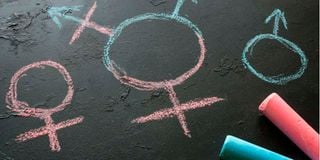
Due to stigma, it is very hard for intersex persons to ‘come out’.
President William Ruto’s backing of United States President Donald Trump executive order recognising only two sexes— male and female— has reignited debate on recognition and protection of the rights of intersex persons.
Intersex refers to people born with physical characteristics that do not fit the typical definitions of male or female. The Kenyan law does not recognise intersex as a separate gender. The Constitution is silent on the issue but prohibits the State from discriminating against a person on grounds of sex.
At present, people who are intersex are forced to choose male or female, and they feel that this adds to the stigma they suffer due to lack of recognition.
“As a lawyer and the chairman of Kenya Christian Forum, we have studied the issue of intersex, which does not stop you from being male or female. It is a kind of disability involving sexuality,” Charles Kanjama said. “Fundamentally, issues of either male or female are personal. This is a difference of sexual development but the physical make-up of intersex person will be either male or female.”
Kanjama said President Ruto’s backing of Mr Trump on recognition only two sexes will not lead to discrimination against intersex persons.
Long fight
Several groups, including the Kenya National Commission on Human Rights (KNCHR) have been fighting for recognition of intersex persons as well as stopping stigmatisation and discrimination
Advocacy groups such as the Intersex Persons Society of Kenya and individuals have in the past lodged court cases to address the exclusion of intersex people, including denial of birth papers and national identity cards.
In 2013, Audrey Mbugua Ithibu sued the Kenya National Examination Council (Knec) after it refused to change the name on and remove the existing gender designation from an academic certificate. In a landmark judgment, the High Court issued an order compelling Knec to change the name on her academic certificates.
in 2009, a woman moved to court after doctors wrote a question mark instead of a gender on her child’s birth papers.
KNCHR has been a friend of the court in the RM vs Attorney General and four others (2010) case, which brought to the fore the challenges faced by petitioners and resultant human rights violations intersex persons face.
It was also an interested party in the case of EA and Another vs Attorney General and six others in which the AG was directed to develop a legal framework governing issues of intersex children, collection of data on intersex children and persons in Kenya and to formulate guidelines to inform treatment of intersex persons.
This led to the formation of the Taskforce on Policy, Legal, Institutional and Administrative Reforms regarding Intersex persons in May 2017.
The task force, whose members were drawn from various institutions, was to among others compile comprehensive data regarding the number, distribution and challenges of intersex persons.
The law on the protection of intersex persons has been in the works since the 11th Parliament, which failed to pass a Bill on the recognition of intersex persons in official government documents.
The National Assembly failed to pass the Registration of Persons (Amendment) Bill, 2019 which sought to introduce intersex as the third gender marker. The current Parliament has also failed to pass the Intersex Persons Bill, 2023 which proposes to add the marker.
The Bill was drafted after the 2019 Census showed that Kenya has a population of 1,524 intersex people. It provides that at birth, an intersex child shall be entitled to be issued with an acknowledgment of the birth notification in writing, indicating that the child is intersex or an official certificate of birth indicating the sex characteristic of the child.
Article 5(1) of the Bill states: "Subject to the law relating to the registration of births and deaths, an intersex child shall be entitled at birth to be issued with a written confirmation of birth or an official birth certificate stating that the child is intersex."
Sub-article two adds that: "The registration shall include the name and date of birth of the child, the name and date of birth of both parents and the sex of the child as male, female or intersex."
The 2023 Intersex Bill provides that at birth, an intersex child shall be entitled to be issued with an acknowledgement of the birth notification in writing, indicating that the child is intersex or official certificate of birth indicating the sex characteristic of the child.








